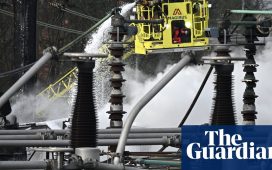Energy, and its future costs and security, is one of the main issues facing this country, yet it has drawn little attention or interrogation in the general election debate.
Our local community faces devastation on a criminal scale, and that is sadly representative of similar cases across the UK. National Grid wishes to build across a vast area of peaceful countryside less than three miles from coastal Aldeburgh and Thorpeness, a thriving tourism destination for ramblers, ornithologists and nature lovers – and to make this a “concrete coast”.
But why? Compare this with the way Denmark, Germany, the Netherlands and Belgium have pioneered new shared offshore grid opportunities. They have relevant specialists focused on the planning and execution. They see the bigger picture. They would not dream of allowing a publicly quoted company to wield the power that National Grid plc has enjoyed in the UK.
Even if we thought it right to ignore how others have tackled the same issues, the reluctance to properly consider using offshore technology – or the more direct delivery routes through the North Sea corridor, straight to London, with connections to the grid at brownfield sites such as Grain and Tilbury – appears at best ignorant or at worst deliberately negligent.
National Grid says: “There is no fully offshore solution to connect offshore wind to the grid in any country. The power has to be brought onshore and connected to the grid.” It says its job “is to carefully consider the most feasible options and present proposals for public consultation, which go as far as possible to address impacts on local communities, the environment and deliver for electricity consumers”, but it seems to be ignoring smarter, more innovative and thoughtful solutions. Instead it favours building vast concrete monoliths up to 26 metres high, towering over church steeples, across no fewer than 80 football pitches, creating one of the biggest energy infrastructure hubs in the world in an area famous for its dark night skies, bitterns and marsh harriers.
It is backed by ministers who should be acting to serve the people of this country as their primary duty but who appear to have been seduced or confused by National Grid’s shareholder-led solutions.
Labour says the answer lies in the Great British Energy concept, of an independent body responsible for solving this issue. But to a threatened community, that reads as nothing more than a shell of an idea, with so little information on how it will work.
Whoever is elected on 4 July will have one chance to get this right. The long-term health of this nation means the issue needs to be solved, but picking up and running with the current plans would suggest that all parties lack imagination and conviction to deliver a sustainable and appropriate solution.
We believe all parties should halt the current ill-conceived proposals until there is a neutral advisory team established to carry out these comparative evaluation studies. We say that National Grid’s East Anglia study underpinning its proposal is flawed from the outset, with too many subjective conclusions that do not stand up to proper scrutiny. The same will be true across the country, where large tracts of land are destined for cables, pylons and blight.
Solving our energy costs and security issues should be an area in which community representatives participate as equals. The term nimby is too easily bandied around to discredit local communities that face a decade of destruction and inconvenience, ecological devastation and further decades of blight because of ill thought through plans.
We don’t disagree with the overall goals for renewable energy, but we do disagree with the fragmented approach, lack of spatial design and failure to use brownfield sites as major hubs. Offshore solutions should be our default position. The current plans appear to be needlessly destructive.
There should be a year’s moratorium so a new and independent team can assess the spatial energy strategy and find the best solutions for the UK.
Political parties seem ready to recognise the seriousness of the issue of energy costs and security. They must find the best solution, not just the cheapest and not just the most rewarding for National Grid shareholders. It must be a plan to the long-term benefit of the UK.











